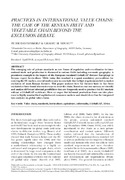| dc.contributor.author | Dannenberg, Peter | |
| dc.contributor.author | Nduru, Gilbert | |
| dc.date.accessioned | 2015-12-14T13:31:30Z | |
| dc.date.available | 2015-12-14T13:31:30Z | |
| dc.date.issued | 2013-02 | |
| dc.identifier.uri | http://karuspace.karu.ac.ke/handle/20.500.12092/1912 | |
| dc.description.abstract | The emerging role of private standards as new forms of regulation and co-ordination in international trade and production is discussed in various fields including economic geography. A prominent example is the impact of the European standard GlobalGAP (former EurepGap) in Kenyan export horticulture. While today this standard is a quasi mandatory precondition for entering the EU market, several studies came to conclude that its high requirements led to market exclusion of most Kenyan farmers. This paper analyses how far farmers have in fact been excluded or have found alternative ways to enter the chain. Based on our own surveys, we identify and analyse different informal possibilities that are frequently used to produce for EU markets without a GlobalGAP certificate. Here we argue that informal production flows can take place even in highly standardised sophisticated consumer markets and should therefore be integrated into analyses on global value chains. | en_US |
| dc.language.iso | en | en_US |
| dc.publisher | TIJDSCHRIFT VOOR ECONOMISCHE ENSOCIALE GEOGRAFIE | en_US |
| dc.subject | Value chain, standards, horticulture, agriculture, informality, GlobalGAP, Africa | en_US |
| dc.title | Practices in International Value Chains: The Case of the Kenyan Fruit and Vegetable Chain beyond the Exclusion Debate | en_US |
| dc.type | Article | en_US |
